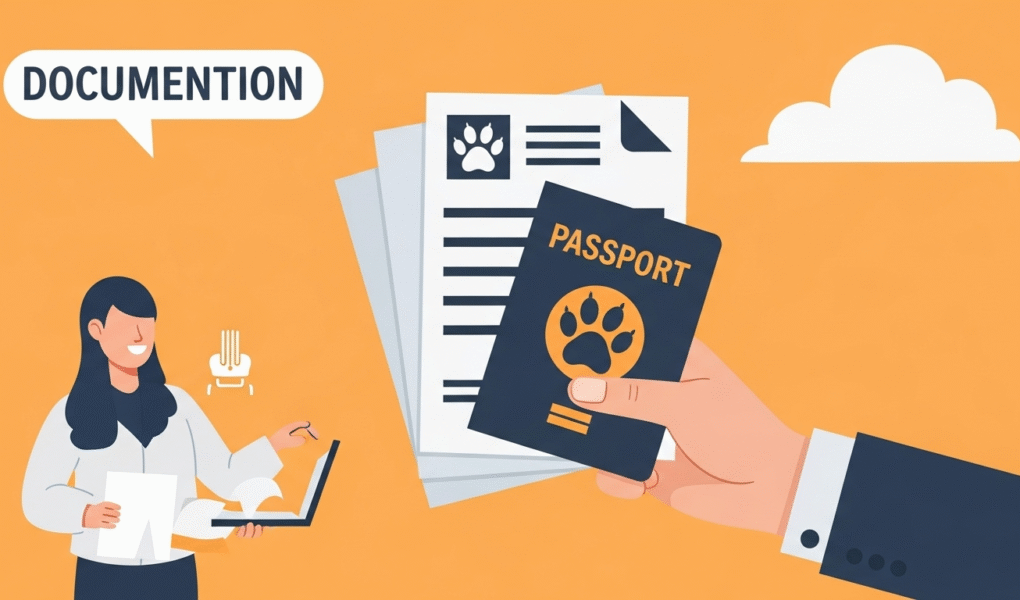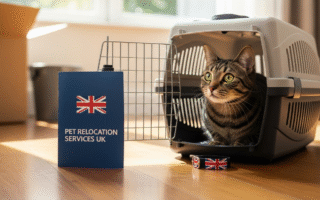When you’re moving under diplomatic orders, the logistics are already overwhelming: packing up your home, organising children’s schooling, managing cultural briefings, and preparing for a completely different environment. With all this happening at once, it’s normal to wonder how you’re supposed to move a pet safely across borders, especially when embassy protocols, ministry approvals, and international regulations vary so widely.
That’s often the moment people look for an Embassy Pet Relocation Service—because the process feels far bigger than a standard international move.
In my experience working with diplomatic households, the biggest benefit of using a specialist service is simple: it takes a massive weight off your shoulders. Instead of trying to understand export permits, consular paperwork, quarantine laws, airline restrictions, and EU or GCC veterinary guidelines, you get a team that shields you from the stress.
Your time is already divided between embassy briefings, policy transitions, and family preparation—outsourcing pet handling keeps one of the most delicate responsibilities fully controlled and compliant.
Why Do Diplomatic Families Need Extra Help With Pet Travel?
Diplomatic moves aren’t regular household relocations. A single mistake in paperwork can delay a posting, affect clearances, or cause serious issues at customs. Pets travelling under official assignments must follow:
- Country-specific veterinary protocols
- Embassy or mission-level documentation
- Aviation security requirements
- Export and import regulations tied to political jurisdiction
- Microchip and vaccination standards that differ between continents
When you add time pressure—sometimes you only have a few weeks to relocate—families often need structured support so nothing slips through the cracks.
What Makes an Embassy-Focused Pet Travel Service Different?
A typical airline-approved transport service only handles bookings and general veterinary steps. But diplomatic households require a much broader scope.
How does a specialist handle document-heavy moves?
A service designed for embassy families usually covers:
- Coordination with embassy administrative staff
- Handling import/export permits through ministries
- Pre-travel health documentation, like USDA endorsements or DEFRA certificates
- Microchip verification according to ISO 11784/11785
- Rabies titre test management for countries such as the UAE, Qatar, Singapore, and Japan
- Ensuring compliance with EU Pet Travel Scheme (PETS), APHIS, CFIA, or DAFF standards
This approach avoids common issues—like missing signatures, wrong chip encoding, expired vaccines, or improper crate measurements under IATA rules.
What kind of real-life problems does this actually solve?
Here’s a real example I’ve seen often:
A diplomatic family posted from Washington D.C. to Riyadh assumed their dog’s vaccinations were fine. At check-in, the airline rejected the paperwork because the rabies serology test was done at a non-approved laboratory. Their posting was delayed by weeks. A specialist provider would have flagged this instantly and prevented the setback.
These small details have enormous consequences when the pet is travelling under government assignment.
What Services Are Usually Included for Pet Moves Connected to Embassies?
Below is a breakdown of what families typically receive when working with a specialist team.
Comprehensive Veterinary Compliance
This includes:
- Microchip verification or implantation
- Full vaccine review
- Rabies titre test organisation
- Health examinations under government-accredited vets
- Country-specific parasite treatments (for example, tapeworm treatment required by EU member states)
- Guidance on timing rules (such as 21-day post-vaccination waiting periods in the EU)
Veterinary rules vary drastically, so having a precise schedule helps you avoid time-sensitive issues.
Official Documentation and Clearances
This is one of the most technical and sensitive areas. Diplomatic families often require:
- Ministry of Agriculture import approvals
- Embassy certification requests
- USDA/DEFRA/APHIS endorsements
- Transit permits for countries like Turkey or Switzerland
- Airport authority clearances
- Consular letters confirming diplomatic status
- Microchip confirmation letters
- Power-of-attorney documentation for pet handlers
These steps are not always public-facing. Some depend on interdepartmental communication, which is why embassy-aware teams manage it directly.
Flight Routing and Airline Coordination
Pets under official assignments often travel:
- Through restricted airports
- On limited carriers due to weather restrictions
- Under temperature-controlled conditions
- In IATA-approved crates sized according to the animal’s standing height and length
Teams usually handle:
- Direct booking with the airline’s live animal desk
- Pre-flight crate checks
- Cabin vs. cargo eligibility review
- Monitor weather embargoes (especially in the Middle East, Australia, and Asia)
- Arranging comfort stops for ultra-long-distance flights
Ground Handling and Customs Support
Diplomatic families often require private or expedited handling at airports. Typical support includes:
- Airport meet-and-greet
- Customs escort
- Inspection coordination with veterinary officers
- Payment of customs and inspection fees
- Airline security clearance assistance
- Handling arrival declarations
In some countries, diplomatic families receive priority processing—but only if the paperwork is impeccably organised.
What About Quarantine Requirements?
Some countries enforce strict quarantine rules (like Australia, New Zealand, Singapore, and Malaysia). A specialist team helps by:
- Reserving quarantine slots
- Handling advance applications
- Managing bloodwork timelines
- Creating a step-by-step prep plan
- Communicating directly with the quarantine centre
Real example:
For a posting from London to Sydney, the government timing requirements stretch over 6+ months. Families that try managing this alone usually miss one of the bloodwork windows. An experienced provider builds a fully-timed plan from day one.
What Does Processing Typically Look Like? (Timeline Example)
Here’s a simplified version of a typical relocation timeline so diplomatic families know what to expect:
| Stage | What Happens | Typical Time |
| Pre-Assessment | Review microchip, vaccines, passport, titre test needs | 1–3 days |
| Vet Work | Blood tests, boosters, tapeworm treatment, wellness checks | 2–6 weeks |
| Government Endorsements | USDA/DEFRA, consulate paperwork, permits | 1–4 weeks |
| Flight Bookings | Airline crate checks, temperature approvals | 1–3 weeks |
| Pre-Flight Prep | Crate training, stress reduction, final vet visit | 3–10 days |
| Travel Day | Airport handling, customs escort, final checks | Same day |
| Arrival | Inspection, clearance, delivery to residence | Same day |
The entire preparation can vary from 30 days to 7 months depending on restrictions.
How Are Pets Physically Managed Throughout the Journey?
Because diplomatic pets often belong to households with busy schedules, the team usually manages:
- Home pickup
- Vet transportation
- Airport transfer
- On-ground support at both ends
- Delivery to the new home or embassy residence
They also provide:
- Temperature-controlled vehicles
- Species-specific handlers (birds, brachycephalic breeds, cats, dogs)
- Monitoring through check-in and loading points
- Travel reports during each stage
What Should Families Know About Safety and Comfort?
Comfort and safety aren’t just a matter of buying a crate. They require proper preparation so pets stay calm.
Teams usually help by:
- Providing IATA-compliant crates
- Adjusting crate size for posture and body length
- Recommending crate training schedules
- Advising on feeding timelines
- Suggesting calming techniques that don’t conflict with airline rules
Many pets adapt better to long travel when crate training starts 3–4 weeks before departure.
Are Some Pets Harder to Move?
Yes. Certain categories need extra steps:
- Brachycephalic breeds (French Bulldogs, Pugs, Shih Tzus)
- Large-breed dogs
- Birds with temperature sensitivity
- Elderly pets
- Animals with chronic medical conditions
Specialists work closely with airlines and embassy medical units to approve these cases safely.
How Do Service Providers Work With Embassy Staff?
Diplomatic families often have support from embassy administrative teams, but those teams don’t specialise in pet logistics. A relocation provider usually coordinates with:
- HR and admin officers
- Travel coordinators
- Security officers (for VIP clearances)
- Consular staff
- Military attachés for certain postings
This coordination ensures every part of the move stays consistent with government guidelines.
Common Mistakes Diplomatic Families Make (and How to Avoid Them)
Here are the issues that cause delays most often:
- Waiting too long to begin paperwork
- Assuming vaccinations meet destination requirements
- Relying on general vets instead of government-accredited ones
- Overlooking transit-country rules
- Booking flights before permit approval
- Using crates that don’t meet IATA sizing rules
- Misunderstanding quarantine timing
A specialist prevents these mistakes before they cause problems.
How Much Does a Specialist Service Usually Cost?
Costs vary depending on:
- The country pair
- Species and breed
- Number of pets
- Health requirements
- Quarantine rules
- Airline availability
- Special handling such as private transfers
Families often underestimate the cost because diplomatic routes may require additional clearances and longer preparation.
How to Prepare Mentally and Practically for the Move
Here’s a simple checklist diplomatic families find helpful:
Home Preparation
- Start crate training early
- Keep vaccine records organised
- Create a small “pet travel folder” for all documents
Before Departure
- Confirm feeding timelines
- Take a pre-travel vet photo (useful for documentation)
- Ensure your pet has a collar with identification
Upon Arrival
- Follow local pet registration laws
- Book post-arrival vet checks
- Introduce your pet to the new home slowly
Example Scenario for Diplomatic Families
A family posted from London to Abu Dhabi needed to move two cats and a Labrador. The rules required:
- Advance import permits
- Rabies titre test
- Tapeworm treatment
- Ministry approvals
- Temperature-controlled routing due to heat restrictions
- Private airport handling on arrival
Their administrative office handled visas and personal papers but not animal procedures. A relocation team coordinated everything, including:
- DEFRA endorsement
- Direct communication with the Ministry of Climate Change & Environment
- Crate preparation
- Airport clearance
- Door-to-door transport
The family arrived after a 7-hour flight and received their pets within hours without any issues.
Conclusion
Moving under diplomatic orders comes with enough personal and professional pressures. Managing pet travel on your own—from government approvals to flight restrictions—adds a layer of stress you really don’t need. When a specialist handles consular documentation, ministry permits, airline communication, veterinary scheduling, customs coordination, and on-ground transfers, the whole process becomes predictable, controlled, and far safer for your pet. These services give diplomatic households clarity and peace of mind, especially when every detail matters during a posting.
At the end of the process, the goal is simple: your pet arrives safely, calmly, and without delays, so your family can settle into your new assignment with complete confidence. And if you want a team that truly understands embassy-level requirements, Pearl Lemon Pets is one of the most experienced providers for these moves.




